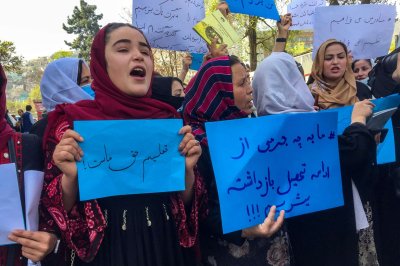
Afghan women teachers protest near the main entrance of the Ministry of Education demanding their education rights and the reopening the secondary and high schools for girls in Kabul, Afghanistan, in March 2022. The Taliban has since severely curtailed women’s freedoms under a new “vice and virtue” directive that bans them from venturing into public without a male guardian or showing their faces or speaking when they do so. File photo by EPA-EFE
April 10 (UPI) — The Taliban’s morality police — some 3,300 officers vested by the regime to enforce its so-called “Propagation of Virtue and Prevention of Vice” laws — routinely detain Afghans for having the wrong haircut or beard-style and not attending mosque for daily prayers, the United Nations said Thursday.
The U.N.’s mission in the country said in a report on the PVPV law over the six months since it came into force in August that men, women, minorities, and young people had been impacted by zealous enforcement across all aspects of daily life, intruding into personal and private spaces, public areas, economic activity and, in the case of non-Sunni Muslims, religion.
Women and girls were worst affected, with the U.N. Assistance Mission in Afghanistan saying it had seen a tightening of restrictions on them, including access to public spaces, dress codes and freedom of movement without a male guardian and that citizens were taking it upon themselves to police women’s conduct.
“Female access to healthcare, already constrained, has been further restricted by women’s inability to travel alone for short distances and female healthcare professionals in several areas described their inability to report to duty because they do not have a male guardian,” the report said.
“These restrictions have also created a culture of uncertainty and fear. Many women reported that enforcement responsibilities have been increasingly taken up by local community and family members, reshaping social and family dynamics.”
UNAMA detailed draconian new measures being imposed on women by PVPV, including not leaving home without a good reason and only with her face and body fully covered, and remaining silent when out in public [although speaking is permitted “when necessary” such as during shopping].
Adult women are also forbidden to look at any man to whom they are not related, although this rule also applies to men looking at women.
However, enforcement was also impacting men due to strict rules on hairstyle and beard length, attendance at prayers and other stipulations, with UNAMA saying over half of arbitrary detentions under the law were appearance-related targeting not only those in violation of mandated beard lengths or hairstyles but also barbers providing non-compliant beard trimming or haircuts.
Mandatory attendance of congregational prayers, UNAMA noted, was particularly closely monitored during the 28-day long Ramadan period of fasting — Islam’s equivalent of Lent — resulting in many instances of those failing to attend being arbitrarily arrested under powers that give PVPV inspectors authority to hold suspects for up to three days and confiscate or destroy property.
UNAMA said the new law grants enforcement powers to a de facto “anti-vice ministry” operating out of the former premises of the Women’s Affairs Ministry and codifies many rules prohibiting “un-Islamic” customs and conduct that were already in force either in some provinces or across the whole country.
These include mandatory face coverings for women outdoors, an Islamic appearance for men, attending prayers and bans on certain festivals as well as music, images of living beings, narcotics, alcohol, the cross, neckties, and “vices” including gambling, prostitution, adultery and homosexuality.
The report noted that the PVPV law had an economic impact on both men and women that was likely to worsen an already dire economic crisis in the country with women’s widespread exclusion from workplaces and education depriving families of part or all of their income, exacerbating poverty.
Men and women were affected due to a particular impact on the small businesses that employ many Afghans, such as private education centers, barbers and hairdressers, tailors, wedding caterers and restaurants whose business activities were curtailed or terminated, leading to a “reduction or total loss of income and employment opportunities.”
UNAMA also found that already highly restricted access to non-state-controlled information sources and freedom of expression were being further impacted by PVPV due to uncertainty around the bans on music and images of humans and animals.
The report concluded that six months in, the infrastructure, propaganda apparatus and personnel the Taliban had assembled to implement the law showed it was determined to distance Afghanistan from its international obligations, pushing the goal of reintegrating Afghanistan into the international community further out of reach.
The mission reiterated the U.N. Security Council’s resolution last month calling on the Taliban to immediately reverse its “vice and virtue” directive.